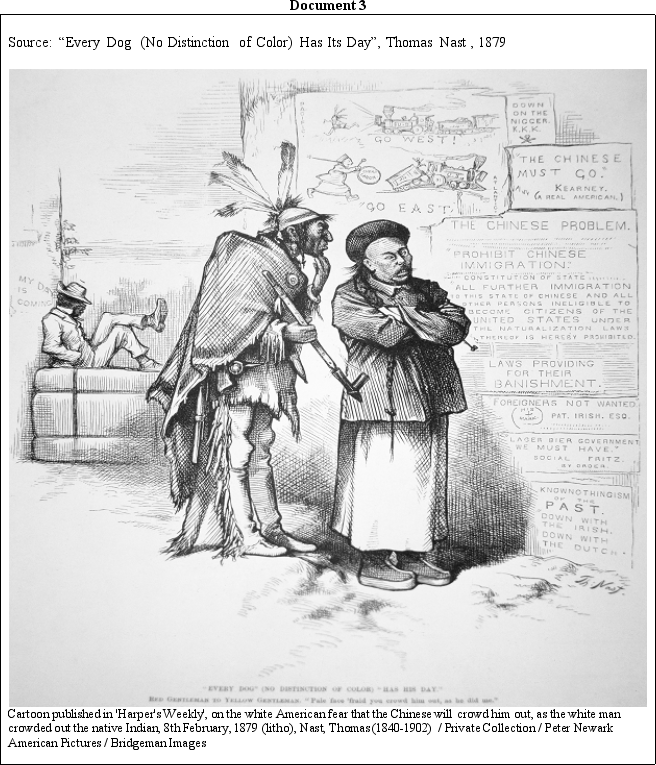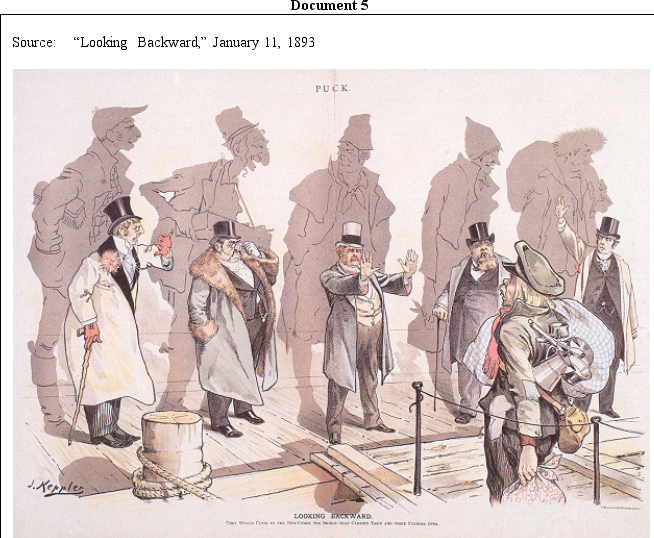DOCUMENT BASED
DBQ Directions
Directions: These questions are based on the accompanying documents.The documents have been edited for the purpose of this exercise.
In your response you should do the following:
•State a relevant thesis that directly addresses all parts of the question.
•Support the thesis or a relevant argument with evidence from all,or all but one,of the documents.
•Incorporate analysis of all,or all but one,of the documents into your argument.
•Focus your analysis of each document on at least one of the following: intended audience,purpose,historical context,and/or point of view.
•Support your argument with analysis of historical examples outside the documents.
•Connect historical phenomena relevant to your argument to broader events or processes.
•Synthesize the elements above into a persuasive essay that extends your argument,connects it to a different historical context,or accounts for contradictory evidence on the topic.
-The immigrants that came to the Unites States post-Civil War were both welcomed and unwelcome.Analyze the reasons for the continued and changing attitudes Americans had toward these immigrants from 1865 to 1898.
Document 1
Source: Burlingame Seward Treaty, 1868
ARTICLE II
The United States of America and his Majesty the Emperor of China, believing that the safety and prosperity of commerce will thereby best be promoted, agree that any privilege or immunity in respect to trade or navigation within the Chinese dominions which may not have been stipulated for by treaty, shall be subject to the discretion of the Chinese Government and may be regulated by it accordingly, but not in a manner or spirit incompatible with the treaty stipulations of the parties.
ARTICLE V
The United States of America and the Emperor of China cordially recognize the inherent and inalienable right of man to change his home and allegiance, and also the mutual advantage of the free migration and emigration of their citizens and subjects respectively from the one country to the other, for purposes of curiosity, of trade, or as permanent residents. The high contracting parties, therefore, join in reprobating any other than an entirely voluntary emigration for these purposes…
Document 2
Source: Immigration to U. S. 1880-1930

Document 4
Source: “The Secret Oath of the American Protective Association, October 31, 1893”
I do most solemnly promise and swear that I will always, to the utmost of my ability, labor, plead and wage a continuous warfare against ignorance and fanaticism; that I will use my utmost power to strike the shackles and chains of blind obedience to the Roman Catholic church from the hampered and bound consciences of a priest-ridden and church-oppressed people; that I will never allow any one, a member of the Roman Catholic church, to become a member of this order, I knowing him to be such; that I will use my influence to promote the interest of all Protestants everywhere in the world that I may be; that I will not employ a Roman Catholic in any capacity if I can procure the services of a Protestant. I furthermore promise and swear that I will not aid in building or maintaining, by my resources, any Roman Catholic church or institution of their sect or creed whatsoever, but will do all in my power to retard and break down the power of the Pope, in this country or any other; that I will not enter into any controversy with a Roman Catholic upon the subject of this order, nor will I enter into any agreement with a Roman Catholic to strike or create a disturbance whereby the Catholic employees may undermine and substitute their Protestant co-workers;…I furthermore promise and swear that I will not countenance the nomination, in any caucus or convention, of a Roman Catholic for any office in the gift of the American people, and that I will not vote for, or counsel others to vote for, any Roman Catholic, but will vote only for a Protestant, so far as may lie in my power… 
Picture History/Newscom
Document 6
Source: President Cleveland, Veto of Literacy Test, 1897
…The best reason that could be given for this radical restriction of immigration is the necessity of protecting our population against degeneration and saving our national peace and quiet from imported turbulence and disorder…Violence and disorder do not originate with illiterate laborers. They are, rather, the victims of the educated agitator…If any particular element of our illiterate immigration is to be feared for other causes than illiteracy, these causes should be dealt with directly, instead of making illiteracy the pretext for exclusion…
Document 7
Saurce: "There was Nathing to Arbitrate," The Fhiladelphia haquirer, August 12, 1899
The refusal of the United States Government to accede to the request of Austria-Hungary to submit to the arbitration of a claim for the payment of an indemnity on account of the killing of Hungarians in the memorable Lattimer riot is entirely justifiable, and it is indeed surprising that the request should have been made. The killing in question was the subject of judicial proceedings, the result of which was to vindicate its legality. It will be recalled that the rioting occurred in connection with a strike of coal-miners. In the course of that strike, and as a means of intimidating the employers, a number of men, among whom were the Hungarians on account of whose death the claims were made, had assembled and had begun to act in a threatening and disorderly manner. Called upon by the Sheriff of the county to disperse, they refused to do so and they suffered as a consequence of their refusal. The verdict of a jury confirmed the rightfulness of the Sheriff’s action and there is not the slightest basis upon which to found a claim against the United States. There is no parallel between this case and that of the Italians who were taken from a New Orleans jail and lynched, and for whom this country did pay a compensation. The Lattimer rioters had no one to blame but themselves, and as the facts are undisputed and undisputable, there is absolutely nothing to arbitrate. The Austro-Hungarian Government could hardly have been serious in its request.
Definitions:
First Year
Refers to the initial year of an activity or entity's existence, often used in the context of a company's operations or a student's academic experience.
Extraction Costs
The expenses associated with the removal of raw materials from the earth or the harvesting of natural resources.
User Costs
Expenses incurred by consumers or firms for the use of assets, services, or capital, which can affect decisions on consumption or investment.
Price of Resource
The cost associated with acquiring, producing, or utilizing a resource, which may include materials, labor, or capital.
Q2: The events described by Greenblatt illustrate which
Q8: Which of the following severely limited the
Q11: Which of the following contributed most directly
Q18: Conservative critics of the American government's reaction
Q18: The Pennsylvania Farmer's complaint about the actions
Q29: Analyze the motivations of the United
Q32: Evaluate the impact of transportation on
Q33: After restructuring, your division has had trouble
Q36: Spanish expansion described in the excerpt contributed
Q50: Under the leadership of John Marshall,the Supreme